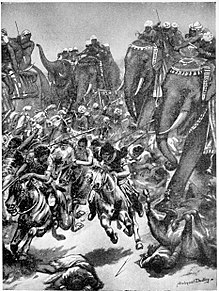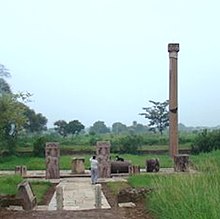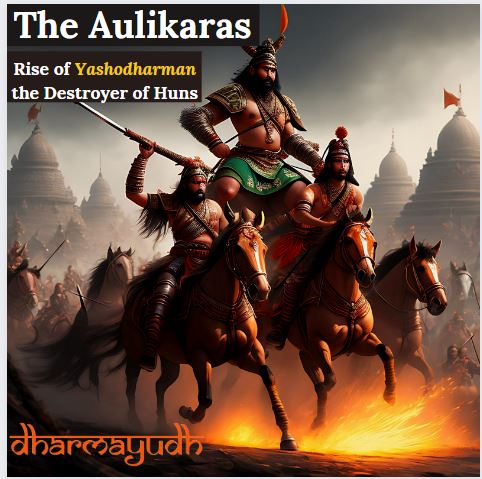The Huns emerged as a dominant power during the period of the Guptas. This new barbarian race of central Asia become famous through their brutal invasion across Europe.

In India, they demolished the famous Taxila University and overran the region of the Indus and Ganga Valleys.
At this crucial period when the Indian sub-continent was in grave danger a kingdom emerged from the region of Mandasor which took the responsibility to face this new tide of the Huns.
This kingdom which faced the brunt of the barbaric Huns was known as The Aulikaras. Their King titled Yashodharman is believed to have crushed the Hunnic invasion led by Mihirkula around the 6th century AD.
The story of the short-lived but powerful and dauntless empire and its forgotten king hasn’t caught the attention of historians. For years their story remained
So who were these people and how did they defeat the force which overran the European kingdom of the Roman Empire and northwestern India? In this article, we will cover the untold and forgotten history of the Aulikaras.
Content
Background
The history of the Aulikaras is a little complex as there are not enough and concrete sources about their origin and early history. However, the inscriptional evidence tells much information about their origin and early kings.
It is widely accepted that this empire originated from the Malavas/ Malavagana on the banks of river Ravi in Punjab. Later around the 1st century AD these people migrated from modern-day Punjab towards the eastern part of Rajasthan and located themselves in the modern Bharatpur region.
Furthermore, several coins have been excavated from the region of Bharatpur and the notable feature of these coins is that they bear the name of Malavanam jayah-malava-ganasya-jayah which confirms the authority of the Aulikaras over the area.
It is also believed that their main city of power was Mandasor dashapura.
Expansion: Consolidation of Aulikara Power
Towards the end of the second century CE, this empire expanded its kingdom territories towards the south. They conquered the region of Chittor and central India.
Later when the power of the Western-Kshatrapas decline around the 3rd-4th century AD the Aulikaras gained significant impetus and conquered some portions of western India too.
Another important belief related to them is that they were the feudatories of the great Guptas. They also aided the Gupta in their campaigns against the western Kshatrapas due to which the former gave them the region of Mandasor around the 5th century AD.
Dynasties
The Aulikaras had two ruling and two associate dynasties. An inscription that belongs to 403-405AD mentions the term Aulikaras and referred a king named Naravarman.
Naravarman Dynasty (Early Rulers
Jayavarmana
Simhavarman
Naravarman
Visvavarman
Bandhuvarman (Believed to have reigned around Mandasor till 436AD)
Due to a lack of available resources, we do not know what happened after the reign of Bandhuvarman. This period is also called the period of trouble in central India.
Later around 500 AD when the Huns defeated the Guptas and their leader Toraman established his authority over western and central India we again hear the name of the Aulikaras.
Prakasadharman Dynasty
This dynasty of the Aulikaras rose around the 6th century AD. The two most important kings of this race were Prakasadharman and Yashodharman. Both these kings are believed to have halted the onslaughts of the Huns.
Drapavardhana
Jayavardhana
Ajitavardhana
Vibhisavardhana
Rajyavardhana
Prakasavardhana
Rise of Yashodharman (530-540 AD)
The Aulikaras reached their zenith during the reign of the Yashodharman. However, as mentioned above we do not have enough evidence about the early history of this monarch.
But it is true that this man rose to power when the Huns were ravaging the parts of western and central India. At that time central India became the epicenter of chaos and unrest.
An inscription located (stone pillar) at Mandasor tells about the military achievements of Yashodharman. He defeated the Huna king Mihirakula and freed the region of Malwa from Huna rule.
Note: The famous Madasor Stone inscription of Yashodharman-Vishnuvardhana of 532 AD tells about the military conquests of Yashodharman. Furthermore, it mentioned Yashodharman as the savior who rescued the Earth from the Rude and Cruel kings of the Kali Age who delight in viciousness.
This engagement between king Yashodharman and Huns took place around the region called Sondani. It is also believed that in this campaign the Gupta king Narsimhagupta Baladitya fought and joined hands with him.

According to the legends the empire of Yashodharman reached as far as the Himalayas in the north, the Mahendra mountains in the south, the Brahmaputra River in the east, and the ocean in the west. However, nothing can be said indeed about the extent of Yashodharman’s empire. But this gives us glimpses of the Yashodharman’s military prowess.
According to the famous historian R.C. Majumdar He (Yashodharman) rose and fell like a Meteor.
LIKE WHAT WE ARE DOING? DONATE TO DHARMAYUDH
If you support what we are doing and would like to contribute to help us grow and reach more Indians to teach them more about such forgotten historic Indian Heroes and stories, please consider donating any amount. It will help us grow.


thank you for presenting out the real history not available in many text books. There are some other online publications like SHUDRA EXPOSED on wordpress.com created by “patriotic indians”.i was going through their articles for some time but lastly felt that,this is a smart act for british designed “lower castes” to convert buddhism. I feel only truth from this articles should be provide for public.
our country needs more persons like u.keep presenting many more topics.
thank you very much sir